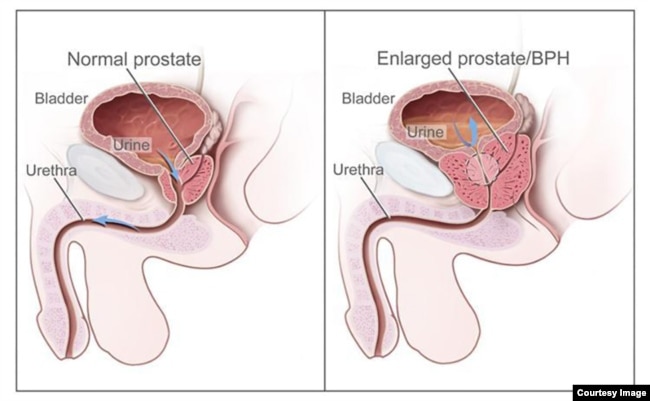AUDIO
What Are Enlarged Prostate and Prostate Cancer?

Britain’s King Charles was treated recently for a medical condition called enlarged prostate. American Defense Secretary Lloyd Austin recently spent two weeks in a hospital for treatment following an operation for prostate cancer.
The 70-year-old Austin did not share any news of his medical condition publicly, at first. He also did not inform President Joe Biden of what the defense department described as a “minimally invasive” operation on Austin’s prostate on December 22.
On January 1, the defense chief developed severe pain and was taken by ambulance to the hospital. He was placed in the intensive care department with an infection linked to the operation. Austin was released two weeks later.
The delay in informing the president and the public led to widespread criticism. A spokesman for Austin said at the time, “… discussions about (prostate cancer) screening, treatment and support are often deeply personal and private ones.”

Defense Secretary Lloyd Austin attends a meeting with NATO Secretary General Jens Stoltenberg at the Pentagon in Washington, Jan. 29, 2024. (AP Photo/Susan Walsh)
King Charles, however, announced on January 17 that he would undergo a “corrective procedure” for an enlarged prostate. His announcement came on the same day the 75-year-old king learned of his medical condition. On January 29, he left London Clinic after spending the weekend there for treatment.
It is unusual for members of the British royal family to share details about their health. However, King Charles decided to share his news publicly to encourage other men to have their prostates checked as called for by medical experts. The palace said the king sought treatment “in common with thousands of men each year.”
What is the prostate?
The prostate is a small organ of the male reproductive system.
It is about the size and shape of a walnut. It sits below the bladder, an organ that stores urine temporarily.
The prostate helps make semen, the fluid that carries sperm cells required for human reproduction. The prostate surrounds part of the urethra, a tube that carries sperm from the testicles or urine out of the bladder through the penis.
As a man gets older, the prostate tends to grow larger. Medical experts say it could grow from the size of a walnut to the size of an apricot by the age of 40, and then to the size of a lemon by age 60. The larger prostate then may press against the urethra and cause problems in passing urine.
The U.S. National Institute of Health (NIH) says men in their 30s and 40s may begin to have problems with passing urine. The agency advises men to seek medical help if they experience any of the four conditions. They are:
- Passing urine more frequently day and night
- Having an urgent need to pass urine
- Having difficulty passing urine or passing urine very slowly
- Feeling pain or burning while passing urine
The NIH says the three most common prostate problems are prostatitis (or inflammation of the prostate), enlarged prostate (also known as BPH, or benign prostatic hyperplasia), and prostate cancer.

Illustration showing the size of normal and enlarged prostate. (Courtesy of the National Cancer Institute)
Prostatitis
Prostatitis is an inflammation of the prostate that may result from a bacterial infection. It affects at least half of all men at some time during their lives.
In the U.S., this condition is most common among younger men. Most cases can be treated with antibiotics medicine. Sometimes, doctors also give drugs to control inflammation and pain.
Enlarged prostate (BHP)
King Charles was treated for an enlarged prostate or BPH.
BPH stands for benign prostatic hyperplasia. Benign means "not cancer," and hyperplasia means unusual cell growth. BPH is not linked to cancer and does not increase your risk of getting prostate cancer.
Those with mild cases of enlarged prostate could simply limit drinking in the evening and use the restroom more often to empty their bladders. Some take drugs that help ease muscles that affect urine flow.
People with moderate cases of enlarged prostate could take drugs that help reduce the size of the prostate. The drugs called “5 alpha-reductase inhibitors” help shrink the prostate, reduce blockage and limit the need for invasive medical operations called surgeries.
In more severe cases, surgery is needed when drug treatment does not work.
The most common surgical treatment is to cut away extra prostate tissue using an instrument, radio wave, or laser. In rare cases, when the prostate is very large, doctors might consider a complete removal of the organ.
Prostate cancer
The American Cancer Society says prostate cancer is the second most common cancer among men. Skin cancer is the most common.
The group estimates that about 1 in 8 American men will be diagnosed with prostate cancer during their lifetime. The number rises to 6 in 10 among those who are 65 or older. The risk is also higher among those with a family history of prostate cancer and among Black Americans than men of other ethnicities.
In 2024, the group estimates there will be 299,010 new cases of prostate cancer with about 35,250 deaths from prostate cancer.
Prostate cancer tends to grow slowly compared with most other cancers. Cell changes may begin many years before a tumor gets big enough to cause noticeable signs.
In addition to difficulties with passing urine, other symptoms of prostate cancer include:
- Blood in the urine or semen
- Painful ejaculation
- And constant pain in the back, hips or pelvis area
There are several screening tests to look for signs of possible prostate cancer. They include urine tests, physical examinations and prostate-specific antigen (or PSA) tests.
If symptoms or tests suggest possible prostate cancer, a prostate biopsy is advised. Doctors remove several small tissues from the prostate and examine the material for cancer cells. Any treatment that might follow depends on how far the cancer has developed.
Most men who have biopsies after prostate cancer screening exams do not have cancer.
In the case of Defense Secretary Austin, doctors said on Jan. 26 that “his cancer was treated early and effectively” and no further treatments will be needed.
Words in This Story
minimally - adv. very small or slight in sizr=e or amount
royal - adj. relating to a king or queen
encourage - v. to make someone more likely to do something
inflammation - n. a condition in which a part of your body is swollen and painful
constant - adj. happening all the time
https://learningenglish.voanews.com/a/what-are-enlarged-prostate-and-prostate-cancer-/7462242.html